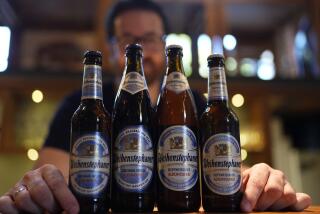Anheuser-Busch Attributes Flat Sales to Tax Increase : Beer: The brewing giant’s slight decline is the first in 15 years. Rival Coors reports record annual sales.
- Share via
ST. LOUIS — Annual beer sales at Anheuser-Busch Co. fell slightly in 1991, the first decline in 15 years for the world’s largest brewer, company officials said.
But rival Coors Brewing Co. said its annual sales set a record, even though the overall U.S. beer industry estimates that sales were off by 2% for the year.
Analysts said the 0.5% drop at Anheuser-Busch is a result of the doubling of the federal excise tax on beer on Jan. 1, 1991, and the recession, which caused beer drinkers to switch to cheaper brands.
The government now imposes a tax of $18 per barrel on beer, which comes to about 32 cents a six-pack.
“I think business is a little softer than even Anheuser-Busch anticipated,” said Ben Steinman, associate publisher of Beer Marketer’s Insights, an industry newsletter.
The St. Louis-based beer maker said last week that it sold 86 million barrels of beer, down from 86.5 million barrels in 1990, a year that included a big sales jump in December.
Meanwhile, Coors Brewing, a subsidiary of Adolph Coors Co., reported a 1.2% increase in beer sales for 1991. Coors, based in Golden, Colo., sold 19.5 million barrels, breaking the record of 19.3 million barrels sold in 1990.
“Although beer industry sales in the United States declined last year from 1990, we are pleased to report that Coors Brewing Co. achieved the highest volume growth rate of any major U.S. brewer in 1991,” said Peter H. Coors, chairman and president of Coors Brewing.
He attributed the record sales to the continued strong growth of Coors Light and Keystone Light, expanded international sales and the introduction of three products in 1991--Coors Dry, Keystone Dry and Coors Cutter, a nonalcoholic beverage.
But Peter Coors said financial results for the fiscal year, due in mid-February, might not be so upbeat.
The higher beer tax apparently affected Anheuser-Busch’s business by inflating sales just before it kicked in.
“What happened, because of the excise tax is that you saw a great deal of activity in December of 1990 before the tax went into effect and then things fell off around this time last year,” said Joseph Doyle, a stock analyst with Smith Barney, Harris Upham & Co. in New York.
Doyle estimates that Anheuser-Busch sold about 600,000 barrels of beer in December, 1990, that normally would have been sold in 1991. If those barrels were included in the 1991 figures, the company’s annual volume would have been up about 0.7%, he said.
The stagnant economy also contributed to the sales decline, Doyle said. Consumers were looking to buy cheaper beers, known in the industry as “popular-priced” beers.
Anheuser-Busch has fewer brands in the popular-priced category than such other breweries as Stroh and Heileman. They haven’t released year-end figures but will probably do better than usual, Doyle said.
More to Read
Inside the business of entertainment
The Wide Shot brings you news, analysis and insights on everything from streaming wars to production — and what it all means for the future.
You may occasionally receive promotional content from the Los Angeles Times.










